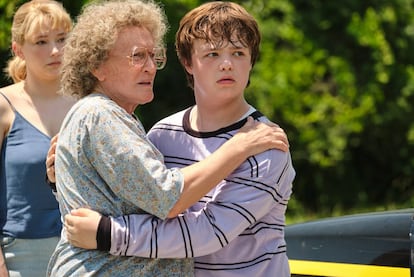J. D. Vance’s biopic is boring and it doesn’t explain much
‘Hillbilly Elegy’ goes over the childhood and teen traumas of Trump’s vice-presidential candidate, which he presents as a story of overcoming adversity

There are films that drag on and on, but in this one, you start looking at the time even before 15 minutes have passed. Hillbilly Elegy is a Netflix film based on the autobiography of J. D. Vance, and that’s enough of a hook, now that the author has been chosen as Donald Trump’s vice-presidential candidate. Vance represents the future of Trumpism, which has taken control of the century-old Republican Party. He is very young compared to the rest of the U.S. political elite: he is 39, and was eight years younger when he wrote the book Hillbilly Elegy: A Memoir of a Family and Culture in Crisis, which was a sudden bestseller. It is an account of his childhood and youth that portrays the malaise of rural America, the feeling of abandonment by the white population of small towns, the drama of the areas that have been de-industrialized by globalization. The factors that explain why so many working-class Americans are voting for Trump and other right-wing populists, even though the latter are willing to dismantle the already precarious public services that protect them.
Vance’s book predates the start of his political career (to which he is a newcomer: he was elected senator in 2022) and it opened the doors to CNN’s talk shows. The film is from 2020, and the names associated with it are of high quality: the director is Ron Howard, the main actresses are Glenn Close and Amy Adams. All three have worked on much better movies. This one is tedious, and the critics mercilessly slammed it: it has one star out of five on Rotten Tomatoes.
The film avoids any political thought contained within the book. Which means we miss the interesting stuff, however reactionary it may sound. We are left with only a tear-jerking drama about the misfortunes of this young man raised between Kentucky and Ohio, and about his desire to excel. J. D. Vance, in fact, had a tough childhood, because his father was absent and his mother fell into heroin addiction, lost her job as a nurse and ended up in poverty and on the fringes of society. We see the teenage Vance rebelling against the situation and, when at some point he begins to surround himself with bad company, he takes a decisive step to move in with his grandmother, a woman who is equally poor, prone to violent outbursts, but very energetic (Vance now boasts that she had 19 loaded guns at home when she died).
We later see the young Vance at the elite Yale University and in his professional beginnings after graduating in Law. In the most select circles he shows off his hillbilly pride, and takes care of his mother who cannot take care of herself. The narrative does not follow his biography any further, even though there would be enough material for it: he served as a marine in Iraq, was a venture capitalist in Silicon Valley, became a millionaire, and his rise in politics has been meteoric.
The film contains conservative messages: the vindication of the family, because even the most dysfunctional family can be saved if it stays together; meritocracy, that word so overused to justify inequality; the war on drugs; the denunciation of the bubble of the urban elites. The context of the industrial decline of the Rust Belt, which marks the book, barely shows up here as a background landscape of abandoned steel plants. Nor is it clear who is to blame for the young man’s problematic environment, being as he is such a believer in individual responsibility.
The gap between the political vision of the majority in the cities (it is absurd to equate them with the elites) and the vision of the peripheries that feel excluded is growing all over the world. This is not just the case in the United States: it has been seen in France, the United Kingdom, Germany, Poland and Mexico. The world’s big cities are today the backbone of progressive views (one of the few exceptions is Madrid, a bastion of the libertarian right) and those who live far from them give themselves over to the hard right. There is much to reflect on about this social fracture. Vance’s book may contribute something to this debate, but the film is nothing more than an almost pornographic exhibition of the personal collapse of a mother and an immodest presentation of Vance himself as a self-made hero. The happy ending came a few days ago: Trump chose J. D. Vance as his running mate and the mother, Bev Vance, who went into rehab and has been off drugs for 10 years, was able to proudly witness it at the Republican Convention where she received an ovation.
If we are looking for a sociological description of the malaise felt in so many territories across the world, any book by the French author Michel Houellebecq captures it better. In a July interview with EL PAÍS, he put it like this: “I bought a house in the country. There are no more doctors there (...). It is a huge failure. There are geographers who have theorized about it. Now the world will be a network of megalopolises, and the rest don’t count, those other people will have to make do as best they can.” This single paragraph helps to understand the problem better that the two eternal hours of Hillbilly Elegy.
Sign up for our weekly newsletter to get more English-language news coverage from EL PAÍS USA Edition
Tu suscripción se está usando en otro dispositivo
¿Quieres añadir otro usuario a tu suscripción?
Si continúas leyendo en este dispositivo, no se podrá leer en el otro.
FlechaTu suscripción se está usando en otro dispositivo y solo puedes acceder a EL PAÍS desde un dispositivo a la vez.
Si quieres compartir tu cuenta, cambia tu suscripción a la modalidad Premium, así podrás añadir otro usuario. Cada uno accederá con su propia cuenta de email, lo que os permitirá personalizar vuestra experiencia en EL PAÍS.
¿Tienes una suscripción de empresa? Accede aquí para contratar más cuentas.
En el caso de no saber quién está usando tu cuenta, te recomendamos cambiar tu contraseña aquí.
Si decides continuar compartiendo tu cuenta, este mensaje se mostrará en tu dispositivo y en el de la otra persona que está usando tu cuenta de forma indefinida, afectando a tu experiencia de lectura. Puedes consultar aquí los términos y condiciones de la suscripción digital.









































